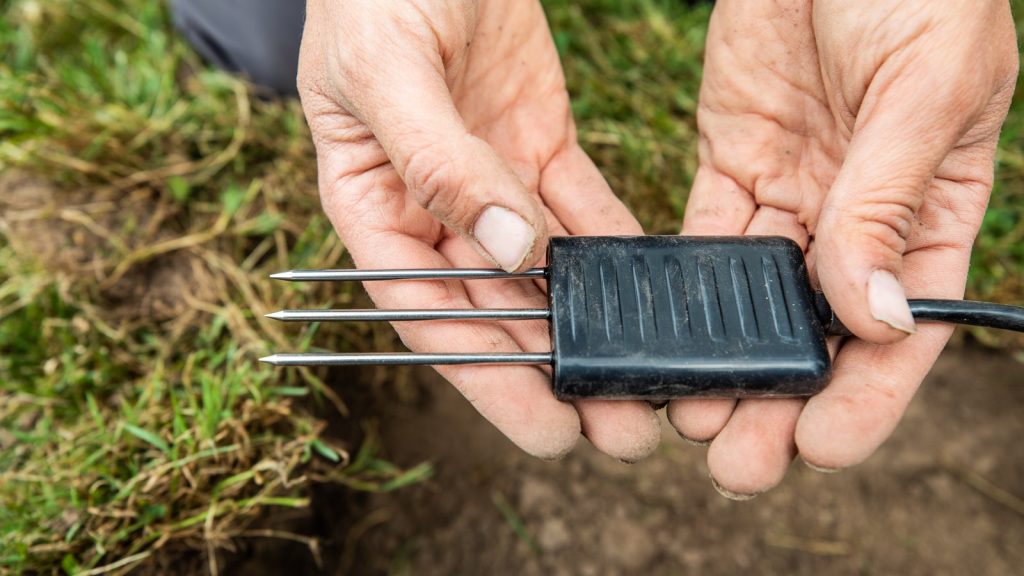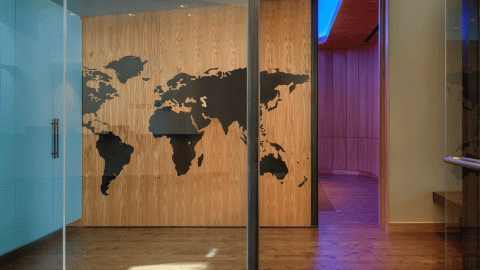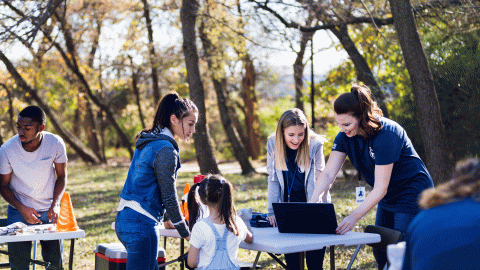How one nonprofit turned a golf course into a ‘no-fail’ job training program
Shawn Bennett was familiar with the feeling of failure when he was younger. Wrestling with anxiety and substance abuse, he had repeated run-ins with the law – and lacked the support needed to put his life on track.
“I was a self-run riot on cruise control to somewhere no one wanted to be,” is how he described his life after spending time in prison for operating a vehicle while intoxicated.
His situation was like many that John Schmidt, CEO and president of U.S. Venture, had in mind when he created Riverview Gardens. This unusual “no-fail” job training program in Appleton, Wisconsin, has helped more than 1,200 people, including Bennett, regain their footing and reclaim their lives. Schmidt, who has also served for years on the board of a local homeless shelter, knows any of us could face poverty, and even homelessness, because of bad luck and without a support system.
“There’s a very fine line today between the haves and have-nots,” says Schmidt. “There’s oftentimes this perception that there’s something wrong with someone who might be homeless. But most times, these are everyday people whose luck wasn’t quite as good as somebody else’s luck in life.”

Riverview Gardens is situated on 72 bucolic acres of a former country club and golf course along the Fox River in Appleton, in the northeastern part of the state. Appleton has historically been known for its paper mills. It also has a legacy of firsts: The first electricity for sale came from a hydroelectric plant built by a paper company executive in the 1880s. It’s also home to the first telephone system in the country and the first electric trolley system.
In another kind of first, Schmidt and the founding members converted the Riverview Country Club into Riverview Gardens. This private country club, Wisconsin’s oldest, filed for bankruptcy in 2011.
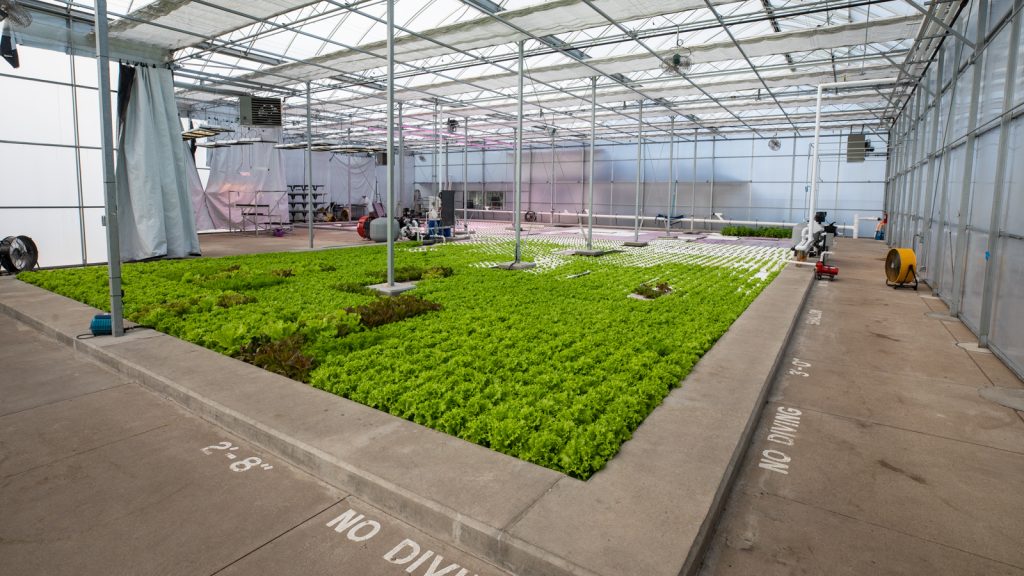
About 25 acres of the site are used for the certified organic farming of fruits and vegetables including beets, potatoes, carrots, herbs, tomatoes, onions and kale. There are 20 passive solar greenhouses also on site. The country club pool has gone from a place for swimming laps to growing lettuce without soil.
The hydroponic greenhouse is often tended to by individuals who are veterans who may have post-traumatic stress disorder or are experiencing homelessness. They find it a more calming environment, in contrast to the noise and activity of the farm.
This nonprofit program is supported in part by Microsoft TechSpark Wisconsin, a civic program that fosters greater economic opportunity and job creation in local communities across the country, particularly in those outside major metropolitan centers. Appleton, with a population of about 75,000, is one of those communities, as is Green Bay, which is about 30 miles away.
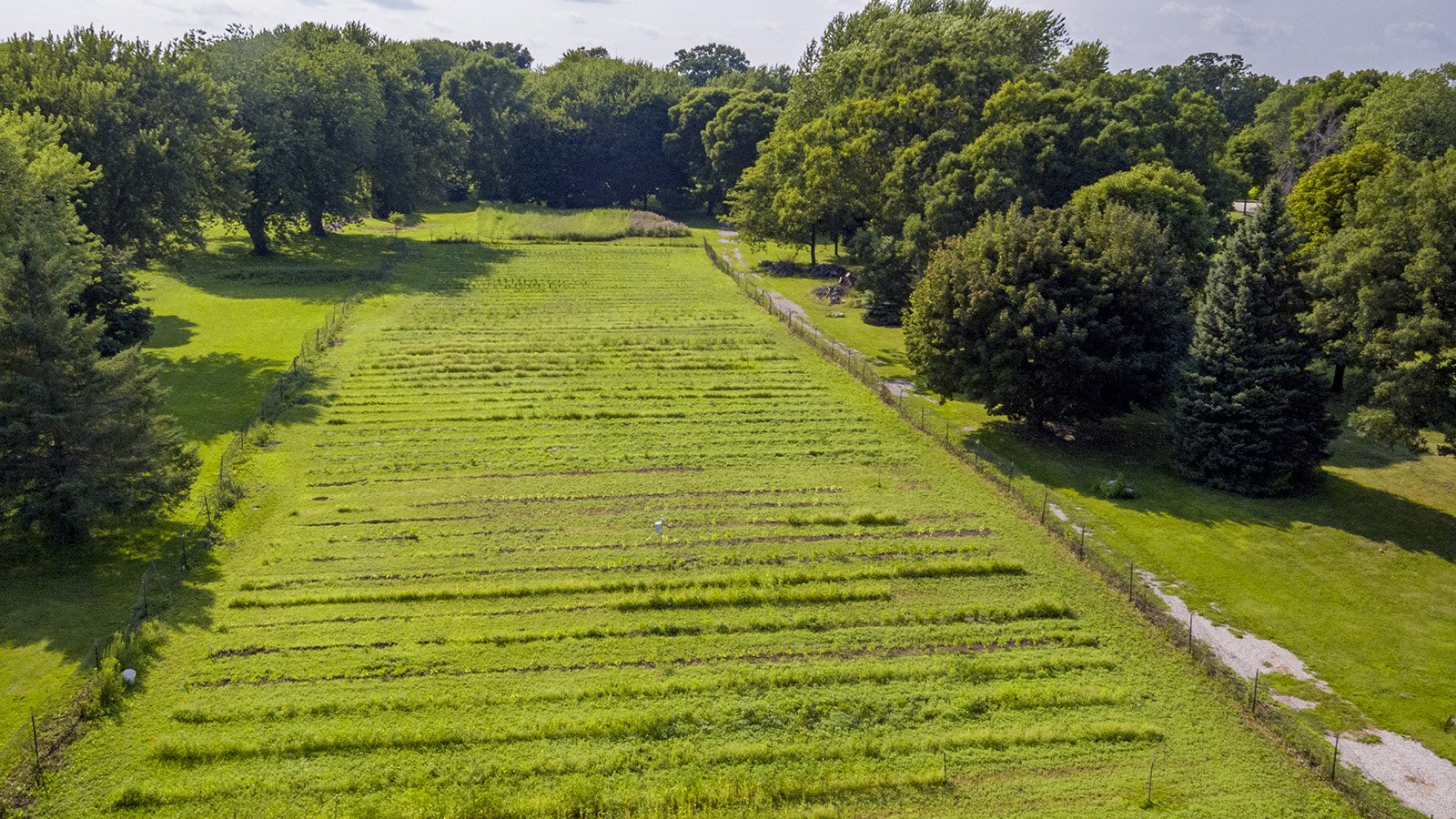
TechSpark is assisting Riverview Gardens in three areas. First, it provides technology that is being used in the hydroponics greenhouse to monitor and adjust water temperature, pH balance and nutrient levels in the pool. That should help to reduce the grow time. The technology is already making a difference, providing a more consistent harvest.
Second, Microsoft’s FarmBeats initiative is being employed. FarmBeats, also an AI for Earth feature project, uses ground-based sensors, Power BI, the Internet of Things (IoT) and TV white spaces (which leverage unused broadcasting frequencies to deliver broadband connectivity) to measure soil irrigation needs. It also helps determine the right time to apply fertilizer and other inputs, as well as how much to apply, to grow a more productive crop. Third, Microsoft is helping Riverview Gardens undergo a digital transformation. In the past, the organization has kept much of its data – records like the seed distribution log, grow crop log, even handwashing logs – on paper. Riverview Gardens is now moving some of it to electronics records for better efficiency.

With these tools, Riverview Gardens can increase its farm yields and raise more money from the sale of produce, which funds the program’s operations. These tools also help give the Riverview Gardens staff more time to spend with the people who need it: their clients.
The technology is “helping us understand our farming better, our water quality better, streamlining our business processes and taking a lot of variability out of the entire operation so that we can focus on the people that we’re serving, and not have to worry as much about other aspects of the business,” says Schmidt.

Those who participate in Riverview Gardens’ program also can work in the kitchen or otherwise help with setup at events at the club, now a community center. They also work to help clean Appleton’s downtown streets, early in the morning, after they’ve received training on equipment used for cleanup. Or they might do maintenance – such as painting, lawn care or snow removal – at other nonprofits and businesses in town.
Once participants complete 90 hours of work – known as ServiceWorks – along with ongoing counseling about job and life skills, Riverview Gardens helps them find – and keep – jobs by following their progress for three years.
“No matter how long it takes you to do 90 hours, whether that’s three weeks or three years, we will always accept you back into the program, and you will just continue where you left off,” says Pilar Martinez, the director of community engagement at Riverview Gardens.
Baked into Riverview Gardens’ recipe for success is its “no-fail” policy. Those who may have experienced roadblocks in the past are provided the tools and opportunities to not fail.
“’Success’ is a subjective term and can be different for many different people,” says Martinez. “We look at the resiliency of the people we serve and the barriers they overcome to move themselves forward.”
No matter how long it takes you to do 90 hours, whether that’s three weeks or three years, we will always accept you back into the program.

For Bennett, “coming out of prison, not having any family – there was no real support, no real comfort,” he says. Bennett, 49, earned his high school equivalency diploma in prison, and is now working as a tech intern at Fox Valley Technical College, which serves about 50,000 students a year.
There, he has earned an associate degree in computer support, and is working on two other related degrees. He was awarded a Fox Valley Technical College Foundation scholarship for an essay about his personal story, something he wrote after going through Riverview Gardens five years ago.
“The sense of community at Riverview Gardens really helped me,” says Bennett. “To be in a place like this, it makes you feel like you’re welcome here. You’re part of something.”

Carl Gustavson, 29, is also among those who found success after going through a tough time. Things became difficult for him after moving to Nashville to pursue his dream of being a musician.
“I thought I was going to be like Woody Guthrie; he rode the rails and played his guitar for people,” says Gustavson. “I kind of had a romantic view of being a musician. But the reality is you can end up living in a tent, like I did, and just start feeling like you can’t do anything.”
Gustavson is grateful for the help he has received at Riverview Gardens.
“I was frustrated – by society and by my situation,” he says. “I didn’t think it was ever going to get better. I thought I was going to be stuck in a rut forever.”
After completing ServiceWorks, he was placed in a job doing detail work at a car dealership last spring. He feels optimistic about the future, and at some point, says he would like to use the bachelor’s degree in marketing he earned in 2011.
’Success’ is a subjective term and can be different for many different people,” says Martinez. “We look at the resiliency of the people we serve and the barriers they overcome to move themselves forward.
Much of the spark and enthusiasm at Riverview Gardens comes from its staff, led by executive director Cindy Sahotsky. She is often right in the middle of the action, no matter the job. When program participants visited Sacred Heart Parish to help remove large stones where a tree once stood, Sahotsky grabbed a shovel and plunged into the work at hand.
“She values people, and she expects that if she’s going to ask them to do something, she has to do her part,” says Laura Savoie, the parish’s business manager. “She pitches right in. And she does have high expectations. She expects you to do what you said that you’d do.”

There is also a three-year “follow” program, based on findings that show individuals who have been incarcerated and are tracked for that length of time, with guidance and counseling, have the lowest recidivism rate, according to Sahotsky.
The follow program offers support with Riverview Gardens alumni who are now employees elsewhere, and also offers those employers guidance regarding behavior. For employees, it can include concerns like how to get a bus pass or feeling like a boss doesn’t like a worker. For employers, it might mean getting Riverview Gardens’ help coaching an employee who is taking breaks too often, or guiding an employee to be more patient in the workplace.
“The people we serve are individuals who have multiple barriers to long-term employment,” says Sahotsky. “Riverview Gardens really came to be to address that root cause of homelessness. It’s not because our folks can’t get jobs. It’s that they struggle to keep them because they have barriers.”
To be in a place like this, it makes you feel like you’re welcome here. You’re part of something.
Sahotsky, who also oversees the COTS homeless shelter in Appleton, the same place where Schmidt volunteers, is a former corporate human resources manager. She knows how such issues can loom large for the clients Riverview Gardens serves.
“Getting the job is just one part of that whole process,” says Sahotsky. “Keeping that job, getting to work, getting along with others – those are all part of it. Having expectations that people who have multiple barriers to stable employment are just going to get a job and keep it is probably not realistic. They’re going to need support to continue along in this process.”
The program is free to participants. In addition to the money raised from the sale of produce grown at Riverview Gardens, revenue from the rental of the country club building for special events is used to run Riverview Gardens.

And not only are area employers involved in hiring Riverview Gardens’ clients, but many from throughout the state also come to work on the farm as volunteers. So do many residents of Appleton. It’s a true partnership. Working together in the fields, no one knows the other person’s title, or background, or standing. They just know one another by the smiles and first names they share.
“The partnerships Riverview Gardens has with employers and the larger community, to create economic opportunities for those who need them, is one of the things that makes it so effective,” says Microsoft TechSpark Wisconsin manager Michelle Schuler. She also serves on this nonprofit’s board. “It’s a real pleasure for those of us at Microsoft to work with Riverview Gardens to help digitally transform their services, and as a result, even more lives.”
That transformation, Schmidt points out, is about recognizing that any of us could be in a position in which we need retraining or other support to help put our lives on better paths.
Top photo: Microsoft’s FarmBeats initiative is being employed at Riverview Gardens in Wisconsin. FarmBeats uses ground-based sensors, Power BI, the Internet of Things (IoT) and TV white spaces to measure soil irrigation needs. Follow @MSFTissues on Twitter.
Photos courtesy of www.ImageStudios.com

